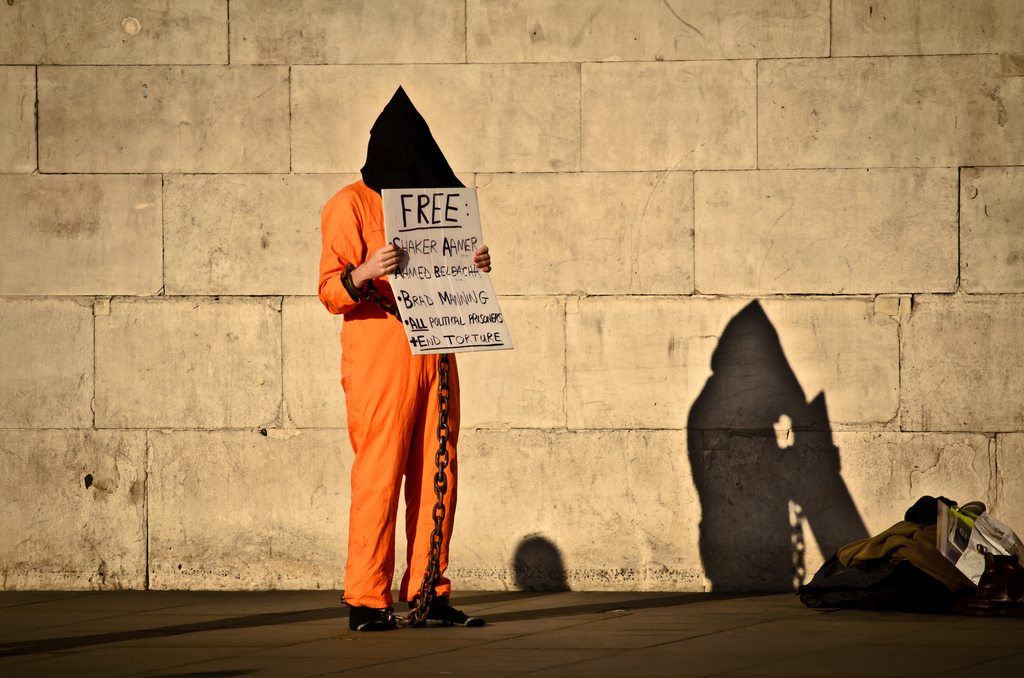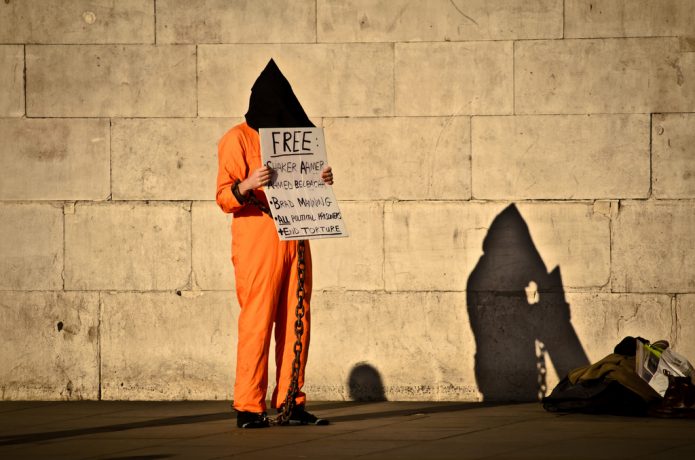June 26th marks the UN Day in Support of Victims of Torture. This day was declared in 1997 and is celebrated every year to honor the struggles of torture survivors.
In the U.S., it’s estimated that there are half-a-million torture survivors who’ve fled other countries in search of a safe haven. While survivors of torture who end up in the U.S. come from all over the globe, there’s a noticeable absence of a particular group of survivors: those tortured by the U.S. itself — and specifically those tortured at Guantanamo Bay.
Since it opened on January 11th, 2002, the prison at Guantanamo Bay has been one of the world’s most notorious. Housed at a U.S. military base on illegally occupied Cuban territory, the prison has held 779 Muslim men behind its bars over the years. For many, the experience has been devastating — not just for those who remain imprisoned, but for those who’ve been freed as well.
The prison currently houses 41 prisoners. Of those who remain, five men have been cleared for release, and 26 haven’t been either charged or cleared. Only seven have been charged in military commissions, and just three others have been convicted. The farcical semblance of justice that the military commissions have been designed to uphold includes a lack of due process rights, admission of hearsay evidence, and surveillance of attorney-client discussions. A fair trial for those detained is pretty much impossible.
However, this isn’t even the worst of Guantanamo, where at least nine men have died in U.S. custody, seven of those by suicide. Adnan Latif, one of the men who died, was a 32-year-old Yemeni citizen who’d spent 11 years behind bars at Guantanamo, even though he was cleared for release three times. Though questions remain about the government’s claim that he committed suicide, Latif suffered from serious mental health conditions. “Anybody who is able to die will be able to achieve happiness for himself,” he wrote in a parting letter to his attorney. “He has no other hope except that.”
But those who are released often fare no better than those still detained.
Take the case of Lutfi Bin Ali, a Tunisian citizen who spent 13 years in Guantanamo only to be released to Kazakhstan. Despite the fact that Bin Ali was subjected to egregious torture at the hands of the U.S. government, he’s expressed an eagerness to return to Guantanamo rather than face the isolation in his host country, where he knows no one. “At least in Guántanamo there were people to talk to,” he told the Guardian last September. “Here I have nobody.”
Bin Ali was told he’d be able to leave Kazakhstan after two years — a period that came up late last year. But similar to those made while he languished in Guantanamo Bay, where he was dubbed a “low risk” in 2004 but not released for another decade, those promises now look flimsy.
Guantanamo has become synonymous with the torture program orchestrated under the Bush administration. Many of the prisoners who ended up in Guantanamo were first subjected to torture in CIA black sites, the details of which can be found in the Senate Select Intelligence’s Committee report on CIA torture. Some of the worst findings include rectal feeding, eye removal, freezing conditions leading to death, and drowning simulations.
Fifteen years later, the security rationale for Guantanamo appears vaguer than ever. What do we win by housing Muslim men in a prison on illegally occupied land, subverting the rule of law to implement outrageous measures of “justice” and condoning and committing torture?
The rule of law in any democracy is built on the premise of accountability — yet, save for a pending civil suit against two psychologists who helped the CIA design its torture program, there’s been none for the torture that prisoners and former prisoners have experienced. Nor has the U.S. agreed to resettle any of those freed from Guantanamo, a move which symbolically cements their guilt despite their release without charge.
The prison’s future remains unclear, though President Trump has stated that no prisoners should be released. He’s even hinted at plans to “load it up with some bad dudes.”
On the UN Day in Support of Victims of Torture, we have a moral and ethical imperative to execute justice — not justice conceived in the height of a national security panic, but justice that is fair, legitimate, and transparent. Nothing short of this will rectify the harm that’s been done to these prisoners — and our democracy.

